[ad_1]
The best WordPress SEO plugins make it easier to optimize traffic to your website.
WordPress is a content management system (CMS) that has always been very SEO-friendly out of the box, with a range of features that were both simple and innovative since the start.
For example, WordPress comes with an easy-to-use URL rewrite system that has never bothered with session IDs in URLs like a lot of community-driven software that was developed around the same time. With a single click you have the option to move from dynamic URLs to simple URLs using dates, numbers, and/or simply letters. The result is a simple and clean set of URLs that have always been easy for search engines to crawl.
Additionally, WordPress avoids common mistakes of duplicated content, in even the most basic install, making sure that it remained very search engine friendly due to its close adherence of web standards, as opposed to many other platforms where developers appeared to code for themselves, rather than users and their needs.
The result is that today WordPress is the CMS of choice and can make for a great website that is fully search engine optimization friendly.
However, despite the great foundations, there are always different ways in that the SEO of a WordPress website can be improved. This may only involve small changes or tweaks, but enough applied could provide a cumulative advantage that is the difference between a successful website and a very successful website.
In this review we’ve compared the best WordPress SEO plugins, looking at the top features of each, including customization options, meta data and schema functionality, integration with products and payment gateways, and cost.
We also feature the Best WordPress plugins.

The best WordPress SEO plugins of 2022 in full
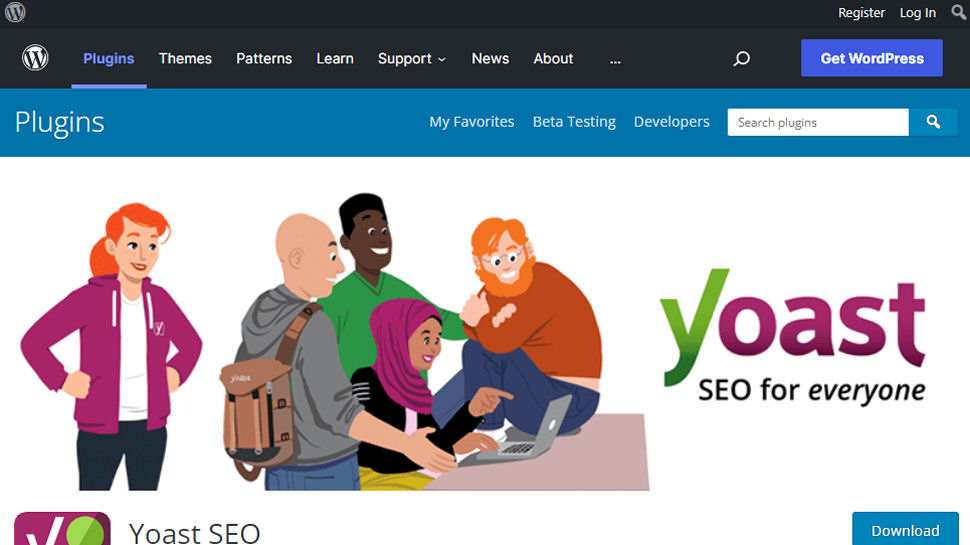
Yoast (opens in new tab) is probably the most popular and established SEO plugin for WordPress, and it comes in both a feature-packed free version and paid-for advanced version.
One of the most useful set of features of Yoast is the ability to customize page titles, headings, and meta-descriptions. This means that rather than the post title dictating the page title and heading, you can assign different ones for each. The advantage here is the ability to ensure keyword variations between each rather than direct repetition.
Additionally, the ability to construct a custom meta-description means you have a chance of this showing in search results rather than a snippet of your next, and so write a description to specifically encourage clickthroughs.
Other advantages are the ability to implement a schema so that search engines can make better use of your site. You can also have better control of breadcrumbs to help with site structure and crawling. There’s also a one-click set-up for creating a sitemap facility to help with crawling.
The premium version extends these hugely useful tools by providing additional support for news, video, local, and Woocommerce SEO. On top of this, the premium tool also provides internal linking suggestions, and content insights based on your most commonly used keywords to make sure you are properly targeting them. There’s also the ability to redirect old URLs to new ones, in order to pass on any ranking benefits to them rather than 404 error pages.
Altogether, Yoast offers an easy-to-use but powerful set of SEO tools, with very useful features in both the free and paid-for versions of the plugin.
Read our review of the Best WordPress hosting

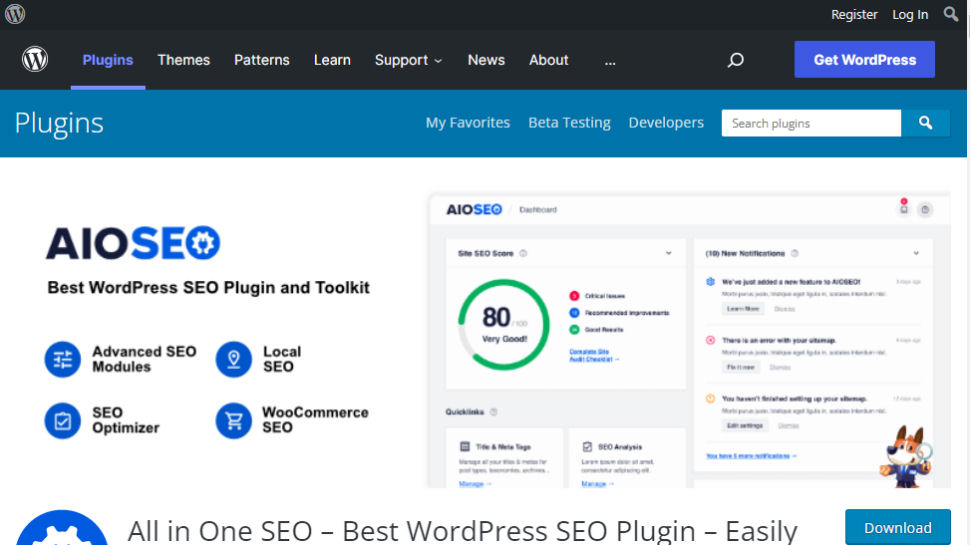
The All in One SEO Pack (opens in new tab) is the original SEO plugin for WordPress, and comes in both free and paid-for versions.
The free version contains a range of essential SEO features, such as the ability to customize page titles and headings to be different, as well as provide meta-descriptions for snippets on search engine results pages. Additionally, it allows for the control of URLs, and comes with a handy redirect to help users avoid useless 404 pages.
For beginners, the All in One SEO Pack comes with a good range of pre-configured settings so you don’t need to worry about these. A sitemap of your content is automatically generated, and there are additional image and RSS sitemap options available.
Experienced users have the option to customize these as required, and the All in One SEO Pack also comes with its own API so that other plugins and themes can extend its functionality. On top of this, the All in One SEO Pack is also optimized to work with WooCommerce.
The premium version adds to the raft of features, with options such as a Google Local Business SEO module, News sitemap module, and advanced SEO options for Woocommerce. There are also additional analytics and tagging options for custom taxonomies.
Overall, the All in one SEO Pack is an established favorite for many, covering essential basics without complicating matters for users. While other SEO packs aim to outdo it in terms of features, this is still a very competent and very useful WordPress plugin to cover your SEO needs.
We also feature the Best WordPress themes

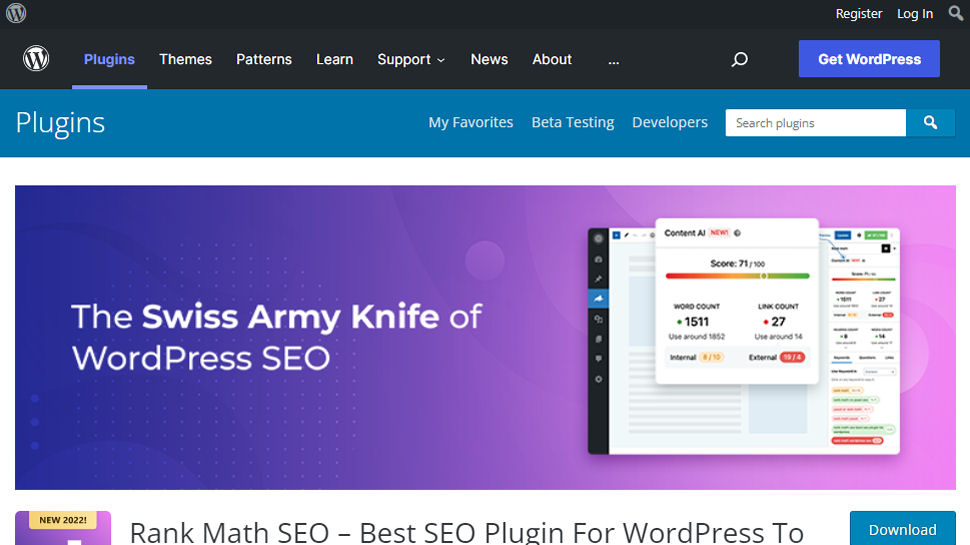
Rank Math (opens in new tab) is a free SEO plugin that comes packed with a lot of features from the start, some of them useful, others not so much. Only there is currently no charge for use, the developers have stated they plan to release a premium version with added features at some point in the future.
Rank Math features in this list of best WordPress SEO plugins because it is easy to set up and use, though offers an advanced install option if you want to choose a customized base configuration. Like with Yoast, you can set up different pages and heading titles, as well as set up meta-descriptions for trying to control text snippets in search results. There’s also a set of options for controlling your site schema, as well as integration with Google Search Console and other tools.
Frankly, the list of actual features for Rank Math is very impressive, and many of these will be useful for those who really want to drill down into a more proactive SEO strategy. However, there are easily more tools than users will need, and it’s unlikely most will be worried about such features as MySpace URLs and Alex verification.
The main concern really is just how aggressively Rank Math is being developed and provided for as a free product – it even comes with an importer if you want to switch from Yoast. Which raises the single concern of how the project will charge to fund itself in future in order to continue it’s already considerable momentum.
Overall, a strong tool with a very comprehensive set of features, but a caveat on how reliant you might become on it.

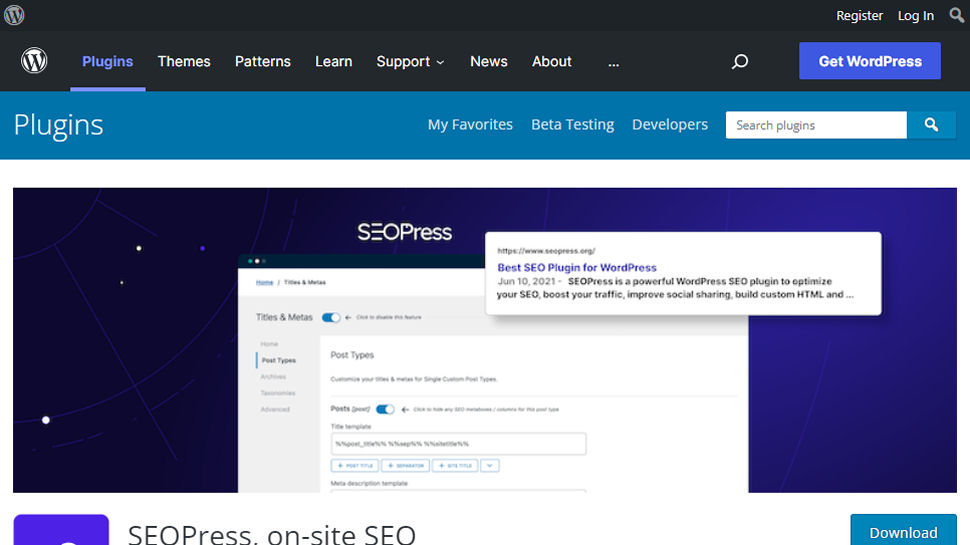
SEOPress (opens in new tab) is another popular WordPress SEO plugin, and like most of the others here it comes in both a feature-packed free version and a paid-for pro version for more advanced users.
It comes with a default setup so that beginners can start without any complications, but settings are customizable for those wanting to tackle them. As expected, SEOPress covers the important basics, such as being able to control the page title, heading, and URL for each individual page, as well as create unique meta-descriptions. There are also auto-generated sitemaps for content and images, as well as for HTML navigation.
However, SEOPress puts a little more focus on the social media aspect than other SEO plugins for WordPress. As well as connecting your accounts, it also uses the Facebook Open Graph and Twitter Cards to help improve sharing. There are also a number of neat URL rewriting and redirection tricks available in the free version.
For paid-for pro users, benefits include much more detailed schema for structured data which can be used manually or automated using advanced conditions. There are also various breadcrumb options, advanced redirects, as well as integration with Google Analytics.
SEOPress is a capable WordPress plugin that offers a wider range of options for users. It even offers the ability to import data from all of the other major WordPress SEO plugins, making it easier for users to swap if they want to.

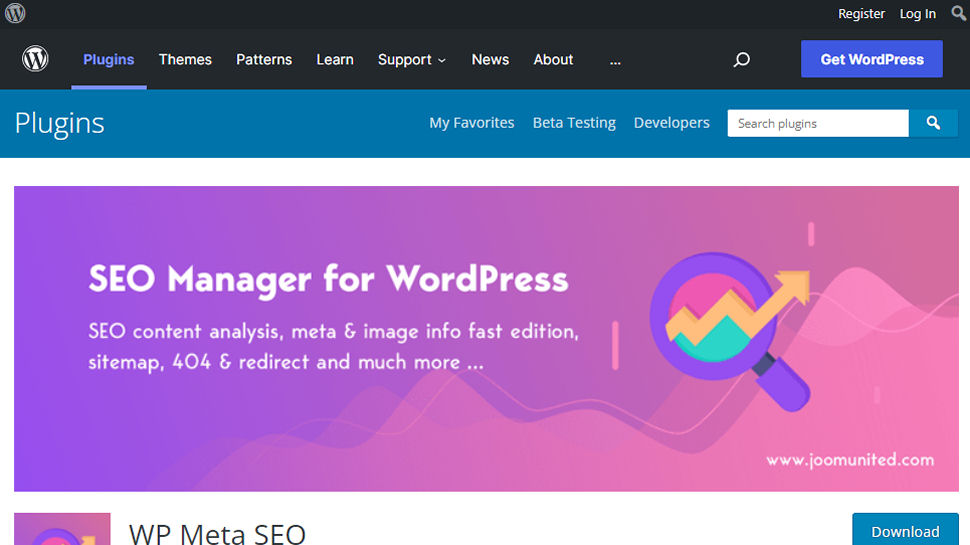
WP Meta SEO (opens in new tab) presents itself as a SEO manager for WordPress, which is also available as both free and paid-for versions, with the specific aim of being able to bulk manage SEO information across your website. This is especially done through the free version by using a meta information manager, which allows you control over meta titles and meta descriptions.
The plugin also includes a sitemap facility, as well as optimization of images such as resizing them in bulk plus being able to edit the meta data of all images for better SEO. There’s also a breadcrumb generator for control of rich snippets and the display of links. You can also run a broken link checker on your site and apply redirects accordingly.
The pro version adds further bulk management tools, such as a duplicate meta checker, automated index of 404 errors, sitemaps link checker, as well as custom email reports. There are also features for adding Google Business Local to your website, as well as SEO optimization options for Woocommerce.
While many of the best WordPress SEO plugins listed above cover day-to-day running, WP Meta SEO does a nice job of putting the focus on bulk management, which could be especially useful for those with an existing and large WordPress website who want to be able to implement a quick and easy SEO solution across the entire site.
Read our review on the best rank checking tools.


Squirrly SEO (opens in new tab) aims to make tweaking your pages to improve your ranking as visually interesting as possible. This makes it very appealing to newcomers, but there’s more than enough here to also entice SEO veterans.
One feature we quite liked was how Squirrly analyses your writing in real time. This is a great way to optimize your pages as you create them. It also offers a series of articles and is incredibly confident that if you follow their instructions, your site will shoot up the ranks – or your money back (conditions apply – obviously).
The whole plugin is visually interesting, using blocks of color (red, yellow or green) to let you know what works, and what needs changing. It also comes with a wealth of features including tracking your performance across over 170 search engines, help with finding the right keywords, and determine how your pages will look when shared on social media – among many others.
Read our review of the best onpage SEO tools.

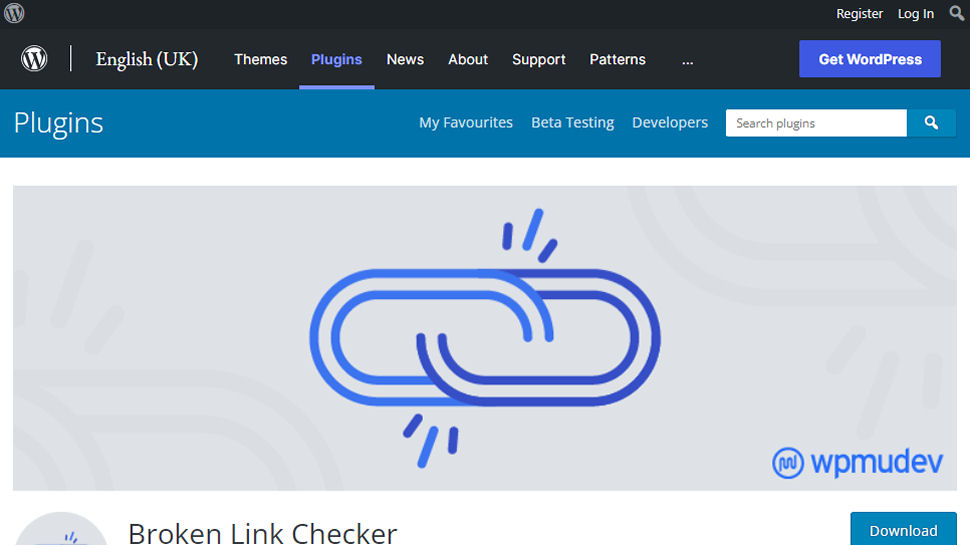
Not only do broken links lead to a bad user experience, it actually hinders your SEO ranking. If you have a small site, it’s highly likely you can manage this on your own, but as your site’s content grows, so does its complexity. Broken Link Checker (opens in new tab) is a very useful plugin to make sure nothing gone wrong with your internal and external links.
Once the plugin has analyzed your site, you can then look at the list of faulty URLs, which you can then edit, delete, dismiss (if the plugin mistakenly tagged a live URL as a dead one for instance), or ignore.
It’s a very simple single purpose tool, but it’s highly useful if you want to make sure your site is as current as it can be, and offers readers a great user experience, not a bunch of discontinued URLs.
We’ve also featured the Best SEO keyword research tools.
What is a WordPress SEO plugin?
The open-source nature of WordPress means that it remains one of the most popular platforms on which to create a website. With thousands of available plug-ins to choose from, users are able to design their website so that it has the features and functionality that they desire.
An SEO plugin is intended to boost the search engine performance of your site, to improve where it ranks when web users search for related topics. Typical SEO plug-ins include features that allow you to input meta data on pages, customize page titles and headings so that search engines have a better chance of finding them, research leading keywords, and optimise images.
How to choose the best WordPress SEO plugin for you?
The first thing to consider when choosing from the list of best WordPress SEO plugins is your level of expertise. Those familiar with the byzantine nature of search engine optimisation will feel comfortable with plugins that provide a more advanced level of functionality. However, if you’re new to SEO, you’re better aiming for a plugin that prioritises a more intuitive and beginner-friendly process to keywords, metadata, and schemas.
Cost will also play its part, and there are some plugins on this list that are available for free, although this is often at the expense of premium features. In such a case, it’s best to try your hand at the free versions first, before deciding whether your site will benefit from paying a little more. When deciding on this, also consider how established your website is and whether it has an existing SEO presence with search engines.
The best WordPress SEO plugin: how we test
We’ve looked at seven of the best WordPress SEO plugins available today, and compared the features that promise to propel your site higher up the rankings.
We’ve explored the possibility of being able to customize individual elements like page titles and headings, noted if the include functionality for inputting meta descriptions and schemas, not to mention monitoring tools for keeping check of broken links or error pages.
We’ve also analysed each plugin’s compatibility with service and product pages, and other relevant business plugins like WooCommerce.
[ad_2]
Source link















